#wuxi
Text
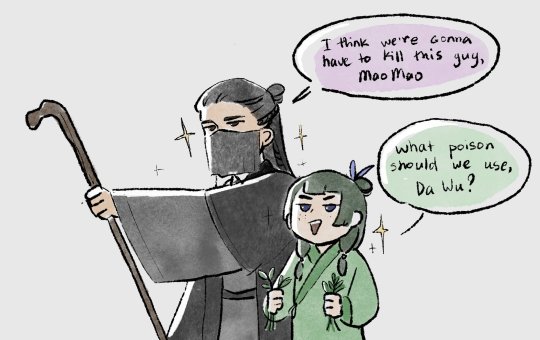
Steven universe meme but it's two poison nerds
400 notes
·
View notes
Text
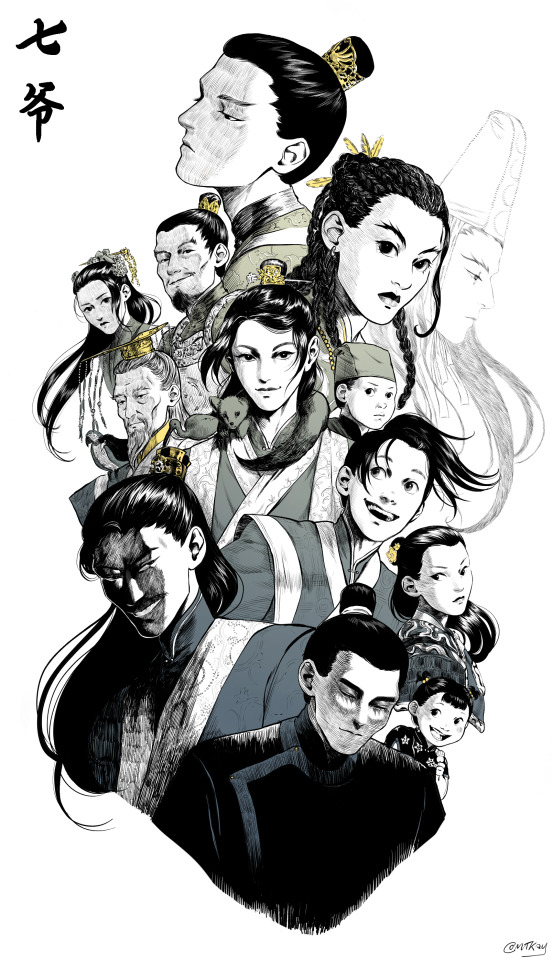
Qi Ye ensemble cast poster, second edition
Yet another one of those LOL Qi Ye just has that power over me. You know the drill; more info below!
I'll go straight to the point: my main reason to draw this was because I wanted to draw the most somber, dark-looking Helian Qi possible with some dark cross-hatching effect.
And because I don't want to draw a Helian Qi solo image because who the HELL does that, I had to turn it into an ensemble cast thing again. I just REALLY like to do that for Qi Ye, for some reasons!!!
For a general note, first: shading was a PAIN but making a nice composition and thinking about how to make a hierarchy that both works in terms of storytelling and visual composition was fun. I also liked finding out the "color scheme" to use and I do like lineart.
So, now, little notes about each character, and the obligatory name poster just so I'm sure we all know whom I'm talking about:
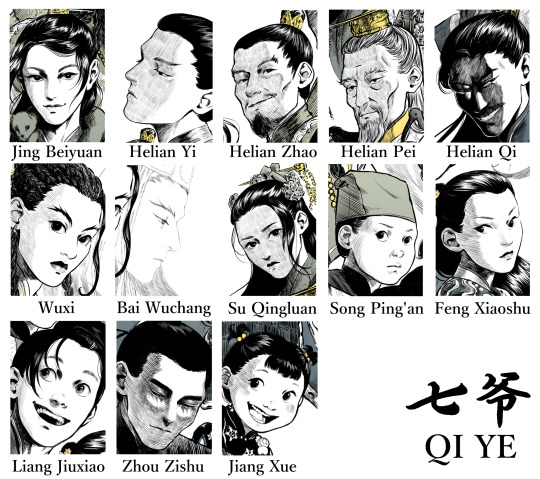
Jing Beiyuan: I've mentioned it before but drawing Beiyuan is like. The easiest for me, I think, out of ALL Qi Ye/TYK characters combined. He happens to have my general goto "pretty face" (which conveniently has peach blossom eyes). I'm happy with how he turned out here! And got to put the sable around his neck which makes for a nice additional touch.
Helian Yi: He's easy to draw as well and I'm glad with how the guan turned out. He initally looked sideways, but I liked it better having him wistfully stare into the distance.
Helian Zhao: has the exact same face as in the other, coloured poster, and that cracks me up bc that wasn't even intentional.
Helian Pei: GDI I find him so hilarious. He looks so done and out of it. Shout out to all his bird as well, which, I find, really complete the look.
Helian Qi: I can't possibly say that I love him as an antagonist because there's nothing to love about this literal trash, but I'm still grateful that we got some of the most rancid stuff going on in Qi Ye just because of him and I'm always here for that. He deserves the villain visual treatment, at least. He was VERY fun to draw and I tried to push that nasty grin and shading as much as possible. He turned out exactly how I wanted him to! (the shading on his face and the balance of light and shadow was a bit of a challenge, actually)
Wuxi: Again, a rather easy one, always pleasant to draw! I loved working on his hair (but complained a lot while doing so)--which I think turned out nicely.
Bai Wuchang: Finally! Finally I draw him!! He had to be there, since he's like. The base of the whole Qi Ye plot. Lining him was....... a pain, but at least it looks nice.
Su Qingluan: nothing much to say--I think it's always important to have her there in Qi Ye stuff, and I put her next to Helian Zhao because of how he tried using her--but it did make me feel bad for her when I realised that.
Song Ping'an: The real star of the show, lowkey, but always alert and present.
Feng Xiaoshu: FINALLY. PRINCESS JING'AN. I'm sorry I took so long to draw her. I want to work on a proper design, I swear. To make up for having completely forgotten to include her in the other spread. I'm so sorry. I like how her face turned out!
Liang Jiuxiao: I never, ever, EVER get enough of drawing him. Have I mentioned how much I like him? How much of a great surprise he was reading Qi Ye? How many times I've wanted to high five because finally someone is as confused as I am? I love drawing this very specific smile on him, SO satisfying. Also Bichen said he was "THE Qi Ye antagonist" and I live for that LOL
Zhou Zishu: do I really need to say anything atp
Jiang Xue: I'm so sorry I put Xiao Xue next to ZZS. The cruelty. But she came out really cute didn't she T_T
Anyway that's it. I'm still obsessed with Qi Ye and given my current (totally secret) retranslation project I'm nowhere near done going crazy about this book.
#qi ye#jing beiyuan#wuxi#bai wuchang#helian yi#helian pei#helian zhao#helian qi#su qingluan#ping'an#princess jing'an#liang jiuxiao#zhou zishu#jiang xue
324 notes
·
View notes
Text

Wuxi: in full "teacher" mode
Luta: in full "student" mode
Beiyuan: in full "my family is adorable! ❤️" mode
-
for the From Jianghu, With Love (@jianghuparty) event!
prompt: Holding Hands
(drawing video here.)
#from jianghu with love#qi ye#lord seventh#xiyuan#jing beiyuan#wuxi#wu xi#luta#nanjiang fam#sable was left out of the family picture (sorry sable 😢)#ibis paint#rinle draws things
45 notes
·
View notes
Text

Pls accept this humble offering of a snippet from the "Oopsie, Wuxi and ZZS were experimenting w chemicals and accidentally invented Jianghu Molly" WIP, to make up for the innumerable agonies of Monday.
21 notes
·
View notes
Photo

The Shamanet of Nanjiang
#qi ye#qiye#lord seventh#qiye fanart#lord seventh fanart#wu xi#shamanet#wuxi#nanjiang#qiye 七爷#Tian Ya Ke#word of honor wu xi#tyk wuxi#beiyuan eat your heart out#priest novels
234 notes
·
View notes
Text


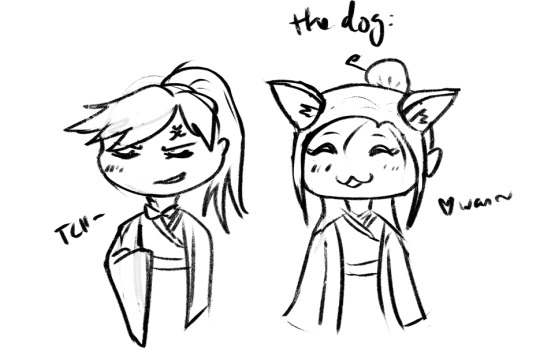
Oh Wenzhou....
#wenzhou#word of honor#faraway wanderers#tian ya ke#shan he ling#wen kexing#zhou zishu#wuxi#i love themb
7 notes
·
View notes
Text
Lost in translation of Word of Honor: southern barbarians and their association with poison
In Word of Honor, Zhao Jing sometimes calls Xie Wang 小南蛮子 xiao nanmanzi - “little southern barbarian”. In the English subtitles, 南蛮 was translated simply as “barbarian”, however, the omission of “southern” not only makes Xie Wang’s ethnicity less specific but also deprives him of an important background characterization: in the Han Chinese folklore, “southern barbarians” have a long-standing association with sinister witchcraft, poison and venomous creatures.
Nanman 南蛮, or nanmanzi 南蛮子 - this is how non-Han people of the South China and Vietnam were called by the Han Chinese in the old times:
The ancient Chinese mytho-geography and cosmography were based on the concept of round Heaven (天 tian) above and square Earth below (天下 tianxia - "Under Heaven"). The Han Chinese lived in the center of this square. They were surrounded by the so-called Four Barbarians: Beidi, or Northern Di - in the north, Dongxi, or Eastern Xi - in the east, Nanman, or Southern Man - in the south, and Xirong, or Western Rong - in the West. This was not ethnic, but a solely territorial classification, based on cardinal directions.
If you read the Romance of the Three Kingdoms or played Dynasty Warriors: Meng Huo, Zhurong, Ahuinan, Wutugu - they are Nanman.
Nan 南 means “south”. Man 蛮 means “southern barbarian”, and also "wild, barbaric; rude, arrogant; headstrong, tyrannical”: the Han Chinese considered themselves more civilized than other nations so they looked at their neighbors with contempt, the same as people of the Roman Empire looked at “barbarians” on their borders.
Now excuse me for a bit, I need to rant. Why do translators blindly trust Google Translate?! Lord Seventh, Faraway Wanderers, Word of Honor - everywhere the birthplace of Wuxi and Xie Wang, a fictional land called Nanjiang 南疆 (”Southern Frontier”), was translated as “South Xinjiang" - i.e. the south of Xinjiang Uygur Autonomous Region (now infamous for the Uyghur genocide). Yeah, 南疆 can be used as a shorthand for “South Xinjiang” but not in this case since it contradicts everything else in the text: Nanjiang is explicitly said to be in the South, its people are called “southerners”, while Xinjiang is in the extreme North-West of China!
Not to mention that the name “Xinjiang” 新疆 (”New Frontier”) for that region didn’t even exist back then, it’s relatively recent: it first appeared in the 18th century, after the Qing Empire conquered these lands.
I mean, Xinjiang:

And the south of China - what fictional Nanjiang is supposed to look like:

The description of Nanjiang in Lord Seventh:
“The dense forests of South Xinjiang that were filled with dark fog year round and the strongholds held up by massive mountains seemed shabby and insignificant in front of this long and unbroken stretch of rivers and mountains that continued on for thousands of miles.”
The description of Nanjiang in Faraway Wanderers:
“The lush green of trees that stayed flourishing year-round, the bright prosperity, the birds that passed by, the ranges of mountains extended up and down uninterrupted, like the curve of a beauty’s back.
This place was South Xinjiang.”
Meanwhile, the real South Xinjiang:

So no, Wuxi and Axinlai from Lord Seventh, Xie Wang from Word of Honor - they are neither Türks (Uyghur), nor Mongols, nor some other steppe nomads from the North-West China or beyond! They are Nanman, “southern barbarians” from the forested mountain lands south of the Yangtze.
This is not only a matter of their ethnic origin - there are also certain ethnic and territorial stereotypes that serve as a background characteristics (the ones that the author doesn’t need to write explicitly) and enhance the image of the characters:
Xinjiang (or, rather, the Great Steppe and the Western Regions): horses, flocks of sheep, steppes, drought, ancient cities of the Silk Road, nomadic Türks and Mongols in sheepskin coats - brute but honorable warriors skilled in archery and horse-riding.
Nanjiang (”Southern Frontier”): impenetrable subtropical forests and mountains filled with snakes and other venomous creatures, mysterious tattooed southerners, shamans and their sinister witchcraft.
Perhaps, if you’ve never heard about Xinjiang, it’s no big deal: Nanjiang, Xinjiang - who cares! But if you have - it’s VERY confusing. Like, why Xie Wang is such an atypical Uyghur, and how Jing Beiyuan and Wuxi managed to get so quickly from Xinjiang to Jiangnan (the region south of the Yangtze where most of the action of WoH takes place) - they had to cross the whole China!, and if they are the Steppe nomads from Xinjiang then where the hell are their horses?!
Ok, back to Nanman.
In WoH, Zhao Jing uses 小南蛮子 xiao nanmanzi (”little Nanman”, ”little southern barbarian”) as an affectionate nickname for Xie Wang. At least once he also shouts it when angry, clearly not meaning it as a term of endearment. So, depending on intonation, the connotation may change from ”oh, my cute little southern barbarian” to “you, stupid little southern barbarian”.
How did the peoples of South China come to be associated with poisons and all kinds of venomous creatures?
In the old times, the south beyond the Yangtze river was a place of exile where no one went voluntarily: there were diseases for which Han Chinese didn’t have immunity, swarms of mosquitoes, lots of venomous insects and reptiles, mountains covered by impassable jungles, hostile tribes, an unbearably hot and humid climate... Being exiled to the South meant practically a death sentence. Many died from local diseases (e.g., malaria), which couldn’t be diagnosed and treated back then, so people believed that evil sorcery and poison were to blame. That’s how the South - and the southern peoples - eventually came to be associated with poison.
Evil sorcery related to venomous insects and reptiles is called gu 蛊, or 巫蛊 wu gu - shamanic gu.
Gu usually refers to: 1) venomous insects; 2) evil magic associated with poisons and curses. There are other meanings as well but these 2 are the most common.
The character “gu” 蛊 (or 蠱, in the traditional Chinese) consists of elements 虫 (蟲) - “insect”, and 皿 - “pot”, and here is why:
To acquire the gu poison, one had to catch five types of venomous creatures - snakes, centipedes, scorpions, toads and spiders, put them into a pot and leave the pot closed for a long time. The creatures inside killed and devoured each other until only one was left. This survivor absorbed venomous qualities of the defeated and eaten enemies and became the most venomous and poisonous creature in the world. Now it could be used as a source of the gu poison - the main weapon of black magicians and sorcerers.
According to some legends, this gu-creature became for the sorcerer something akin to familiar of the European witches. With its help, one could inflict diseases or malicious curses - or use it for mundane tasks, like keeping the house clean and tidy. If a gu-creature was fed small children (adults were also ok, but, apparently, harder to get), it defecated in gold and silver, making its owner rich: the Han Chinese believed that in the South it was customary for families to rely on a gu-creature for the prosperity of the household.
The Miao (Hmong) people who live in South China, in Vietnam and in some other countries of Southeast Asia, came to be especially strongly associated with gu.

According to the Han Chinese superstitions, each Miao wielded a sinister sorcery-gu. Travelers to the southern lands were even advised to use silver chopsticks: supposedly their tips would blacken if gu poison is added to the food. The fear of gu was so strong that even in the beginning of the 20th century in China the Miao were forbidden to visit city markets.
In the Chinese WoH fandom, there is a fanon that Xie Wang is an ethnic Miao. A “southern barbarian” whose national name Xiejieliubo 蝎揭留波 includes character 蝎 xie - “scorpion”, who specializes in poisons, and leads an organization called “Venomous Scorpions” inevitably draws an association with all the gu-related folklore and thus with Miao. In this case, Great Shaman Wuxi and, probably, Du Pusa (Venomous Bodhisattva; seductress who uses poisons) should be Miao as well.
Miao women were considered especially knowledgeable in gu witchcraft. Travelers were warned against romantic liaisons with Miao women: they would seduce the man, then secretly add gu poison into the food and make their lover promise to come back. Woe to the one who breaks this promise: the slow-acting poison will mercilessly kill the unfaithful lover.
Most likely, the demonization of women of the South was caused by their relative freedom in comparison to the Han women. Although this quote doesn't speak about Miao, it presents the overall image of women of the southern tribes in the eyes of a Han Chinese of old:
“Li [Jing in 1304-05] observes many native customs that sharply contrasted with those of the Chinese, the most striking of which is probably the role of women, in terms of their dress, social and economic roles, and marriage. In the case of the Bai people, girls and widows would freely have sex with men as and when they liked. As for the Luoluo, women let their hair down and wore cotton clothes; the wealthy wore embroidered clothes, while the commoners put on sheepskins, and the skirts of girls hardly covered their knees. [...] Virginity was not important, and girls had the freedom to have sex with men; virginity may even have been a barrier to marriage. If a girl died before marriage, all the men who had had relations with the girl had to hold up a banner to see her off. If the banners numbered 100 (or more), the girl was considered to have been especially beautiful. Her parents would cry and lament: “How could we have known that our daughter who is loved by so many men would have died so young?”
The Moxie women in the Yunnan-Tibet border area wore felt wraps and black clothes. They went barefoot, and wore their hair in buns. Women wore wool yarn as a skirt, with much of the body uncovered. Even when married, they were not restrained from having sex with other men.
[...] Before their marriages, the Luoluo women first had to have relations with the shaman, and then dance with the groom’s brothers. Only after that could she be married to her husband. If one brother refused to dance, he would be considered unrighteous and could threaten the relationship among his brothers. Women played important and influential roles in tribal politics. If a Luoluo chieftain died without a male heir, his wife or daughters would take the position. The female chieftain often had a dozen male attendants, with whom she could have sex. Moxie women in north-western Yunnan sometimes acted as mediators when a war between tribes broke out.”
Between Wind and Clouds: The Making of Yunnan, Second Century BCE to Twentieth Century BCE by Bin Yang
Now I think it’s clear where Du Pusa character stems from: a seductive beauty from the South whose main weapon is poison.
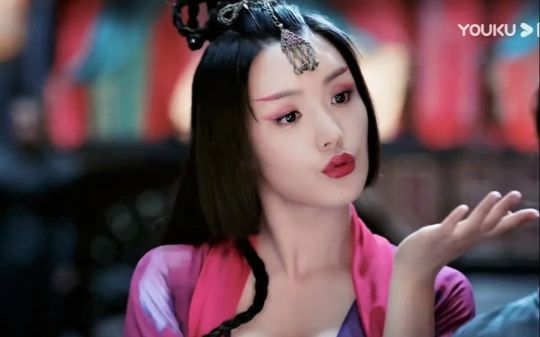
Of course, the folklore about gu witchcraft found its way into the wuxia genre. Jin Yong, considered one of the founders of this genre, laid the base of how the “southern barbarians” are portrayed in wuxia and strengthened their connection to poisons in the popular culture.
Several of his novels depict the Five Poisons cult 五毒教, or the Five Immortals cult 五仙教. This cult is based in South China, more specifically, on The Five Poisons Mountain in Miaojiang 苗疆 (“Miao Frontier”). “Five Immortals” in the cult’s name refer to “five poisons” - five venomous creatures used in the gu sorcery: toads, spiders, scorpions, snakes, and centipedes.
For example, in Jin Yong’s Smiling, Proud Warrior the head of the Five Poisons cult, Lan Fenghuang (Blue Phoenix) is knowledgeable in poisons and commands various venomous creatures. In the novel, she is described as wearing Miao dress so some adaptations base her design on the Miao traditional costume, others go for a “generic barbarian” look typical for Chinese tv (with obligatory “barbarian braids”):
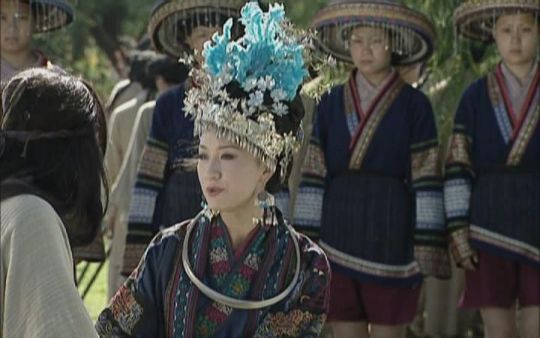
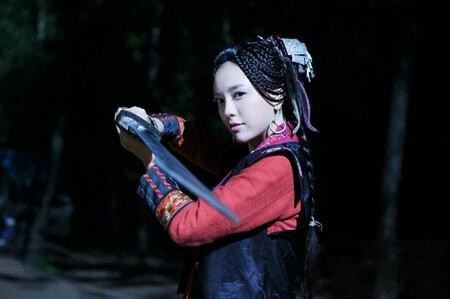
Most members of the Five Poisons cult are women skilled in using poison and seduction.
After Jin Yong, the Five Poisons 五毒 organization can be found in other books, online games, etc. Here are characters belonging to The Five Poisons faction from games 劍網三 and 天涯明月刀:


The gu sorcery is very popular in wuxia and xianxia, although not every character using gu hails from the South. In Jin Yong’s Legend of the Condor Heroes, there are several practitioners of gu, most notably Ouyang Feng. In Xiao Ding’s Zhu Xian, Qin Wuyan from the Thousand Poisons Sect controls all kinds of venomous creatures by playing his dizi flute. In danmei-novel Poison of the Human Panacea, swarms of gu insects live inside the body of their master. And so on.
Chinese ficwriters can be very creative with how gu creatures are used: as an aphrodisiac, or a mind-control device (like a Brain Slug), or a gu creature transforms into tentacles that obey the gu master (tentacle porn with another character ensues), or there can be all kinds of drama and suffering when a character raises or is forced to raise an especially powerful gu inside their own body, etc.
So, as a conclusion:
If in a Chinese media there is a “southern barbarian”, most likely he/she will be associated with witchcraft and poison (speaking of Priest’s novels and their adaptations, that would be Xie Wang in WoH, Wuxi in Lord Seventh). And if there is an expert in poison - most likely that will be someone from the South.
This is why it’s an important detail that Xie Wang is not just any “barbarian”, but hails specifically from the South, as it explains his affinity with poisons and reinforces his image as a dangerous and venomous creature.
#word of honor#lord seventh#shan he ling#wuxia#the smiling proud warrior#xie wang#du pusa#priest#wuxi#qi ye
220 notes
·
View notes
Photo

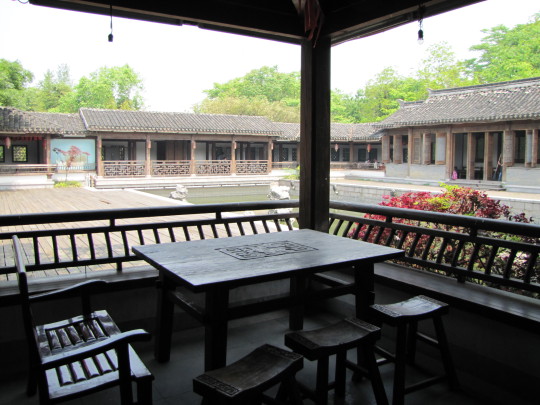
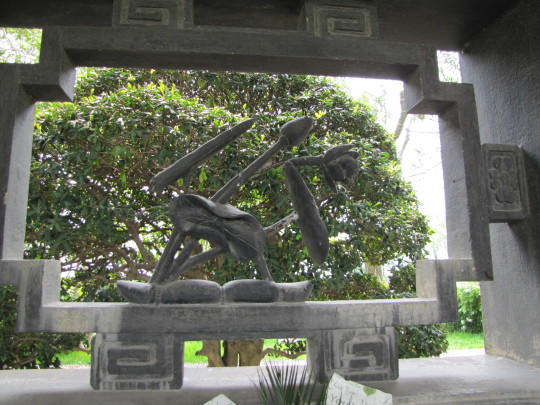


short trip to Wuxi
Yuantouzhu / 鼋头渚 / 黿頭渚
21 notes
·
View notes
Text
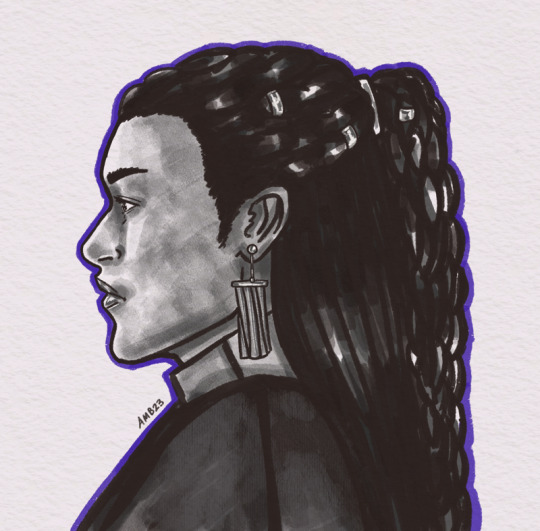
On my “get more people to read Qi Ye” agenda. Wu Xi immediately stole my whole heart. I’m very fond of reserved characters who don’t have time for nonsense 💜.
A big proponent of 'say what you mean and mean what you say'/ doesn't get all the posturing and two-faced behavior from most of the imperial court. Blunt and honest. Just wants to stay home and train/study (has that one person that drags him out of the house every now and again). Truly relatable lol
(side profiles are my go-to when sketching, idk they’re fun)
32 notes
·
View notes
Text

Day 1 of the LNY prompt "Beginnings" for DZZSLNYminifest
Wu Xi and Jing Beiyuan from Qi Ye meeting for the first time as children.
Drawn in Rebelle, still trying to get used to the tools
47 notes
·
View notes
Text

Translated Xiyuan (translation by @shinohayas) spread from the SHL official setting book. Full image on my twttr.
61 notes
·
View notes
Photo
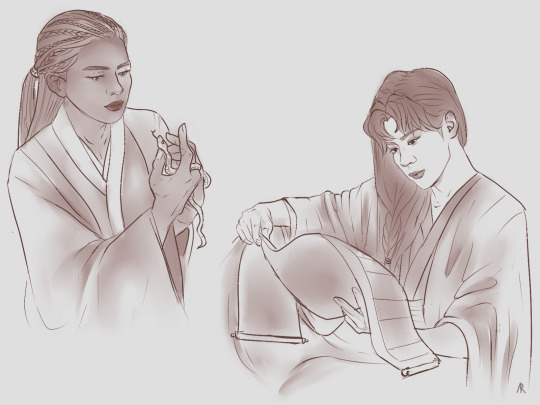
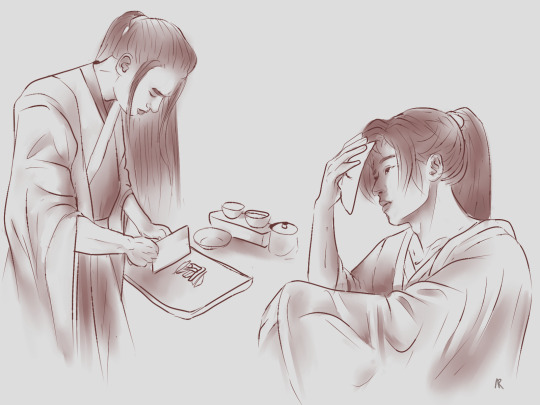
Xiyuan and wenzhou just chilling.
Warmups/contrast studies that got away from me. I’m not sure I’m any better at contrast, but have the boys doing things they like.
#word of honor#faraway wanderers#xiyuan#wenzhou#wen kexing#zhou zishu#jing beiyuan#da wu#wuxi#tian ya ke#shan he ling#woh#shl#tyk#qi ye#lord seventh#my art
117 notes
·
View notes
Text
Some sad moments in C-BL novels I've read
spoilers warning!!!
Qiang Jin Jiu : Li Jianheng's death - i didn't like him that much so i was surprised that i was sad... but he really was trying his best to be a good emperor. in his last moments he was worried about Xiao Chiye and Hai Liangyi... what really broke my heart was when he said 'don't make me the emperor in my next life... i want to be born as a swallow in dazhou' all he really wanted was to live his life happily and have fun... the author really wrote it so beautifully
TGCF : When HC disappeared - 'There is no banquet in the world that doesn't comes to an end' i can't explain the way this line tugs at my heart... like we all knew he's going to come back but i couldn't help being sad about it... Hua Cheng was literally always there, so it caught me completely off guard when he started fading
Qiang Jin Jiu : (again) Xiao Fangxu's death - i wasn't expecting it. i wasn't expecting it all. i know the the war was ongoing but i still wasn't expecting it... i wish i could transmigrate into the novel and hug the poor wolf pup (even though Lanzhou would probably hack my head off) and it being a trap made me feel worse about it for some reason
Lord Seventh : although it wasn't particularly a moment but He Lianyi pining for Beiyuan was kind of sad to me... for some reason... i didn't like He lianyi that much either but i'm sooo weak for the unrequited love trope... whether it was because of the circumstances or the people themselves that they couldn't be together but He Lianyi truly loved Beiyuan and no one can tell me otherwise. but that doesn't means i don't like the canon ship coz i love love looooove wuxi sm and Beiyuan deserved someone like wuxi.
Dinghai Fusheng Lu : Che Luofeng - let me tell you i'm still traumatized. i hated what he did, how he treated Zhou Zhen and poor Chen Xing also suffered but i still felt bad that he had to end that way... that's just what the beauty of writing is... these authors write so beautifully it can't be blamed on me... it's not like i wanted him to live but it's not like i wanted him to die either... thankfully in the next half he lived, but still... the unrequited love...
Fox Demon Cultivation Manual : the truth about Feng Zhoujun - firstly i liked this arc a lot... despite my emotions being played at every turn... after seeing how Jiang Liang was harassed, humiliated and beaten up before "Feng Zhoujun's" eyes i hated Feng Zhoujun(obviously) but when the truth was revealed which was that the real Feng Zhoujun loved Jiang Liang so much he would literally give him the world i was so heartbroken. how Feng Zhoujun tried so desperately to hang on but still died... how Jiang Liang saw Feng Zhoujun dying but he was still unable to do anything... it was all sad to me... (bless wen changchu for hanging madam bitch feng to death)
alright this post became way too long so i guess this is enough for one post... (i haven't finished QJJ yet so i have no idea what's in store for me up ahead)
#mxtx novels#qiang jin jiu#mxtx#tgcf#hua cheng#shen lanzhou#xiao chiye#cezhou#priest#priest novels#feitianyexiang#Chickengege#lord seventh#dinghaifushengrecords#xiangshu#chenxing#cheluofeng#jingbeiyuan#wuxi#tang jiuqing#foxdemoncultivationmanual
3 notes
·
View notes
Text
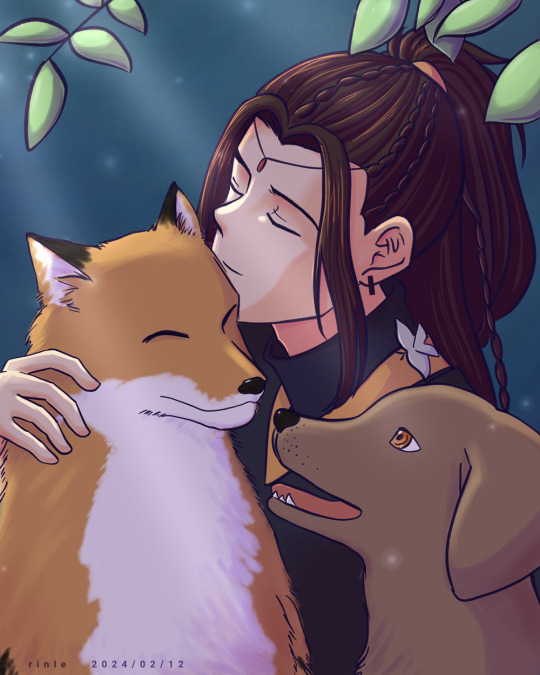
(1) Interesting how Beiyuan's past lives were various fauna & flora; meanwhile, Wuxi is particularly good at taking care of that menagerie of his.
(2) Beiyuan's past lives deserve all the kisses, too.
-
for the From Jianghu, With Love (@jianghuparty) event!
prompt: Kiss
(drawing video here.)
#from jianghu with love#qi ye#lord seventh#xiyuan#wu xi#wuxi#jing beiyuan#(well kinda)#lmao those really don't look like jasmine plant leaves#i don't know how he's supposed to kiss that insect but i'm sure he'll do his best#ibis paint#rinle draws things
33 notes
·
View notes
Text
Six Fanart Challenge!
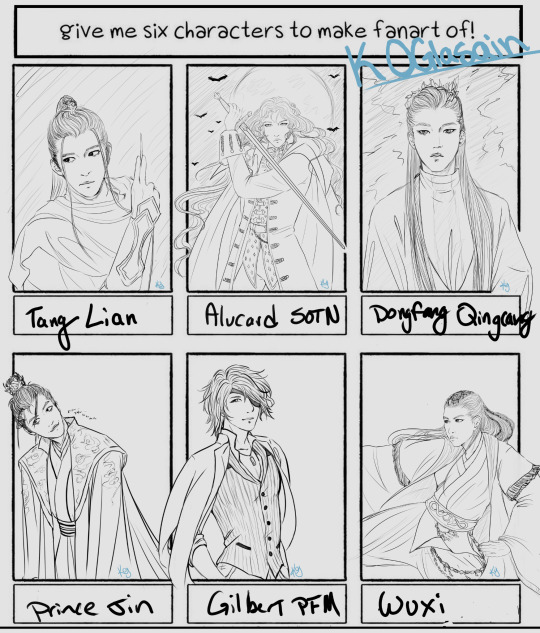
#sixfanarts#cdrama#alucard#castlevania#tang lian#the blood of youth#gilbert redford#word of honor#prince jin#dongfang qingcang#love between fairy and devil#wuxi
13 notes
·
View notes
